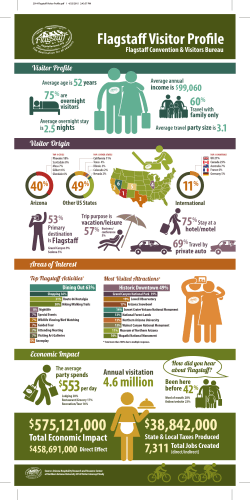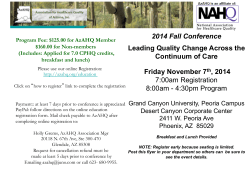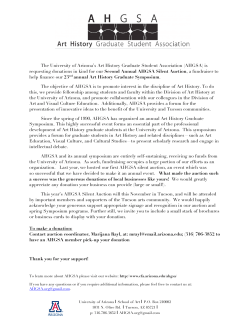
Arizona Adventure: Natural Treasures of the Navajo Nation
AN ARIZONA A DV E N T U R E Natural Treasures Abound on a Drive through the Grand Canyon State’s Navajo Nation Written By Robyn Roehm Cannon Shimmering red rock buttes rising up from the mile-high valley floor make Monument Valley one of the most iconic landscapes in the American West. Director John Ford filmed seven Westerns here and called it “the most beautiful place on earth.” A Arizona is undoubtedly best known for its magnificent Grand Canyon, the 1,900-square-mile cavern that receives more than five million visitors annually and is one of the United States’ most treasured National Parks. But this southwestern state has an abundance of natural wonders, from ancient Native American ruins to crystal-blue lakes and rock formations hundreds of feet taller than the Washington Monument. A great way to explore Arizona is to fly into Phoenix for a few luxurious days in the area’s lavish hotels and spas (see “Luxurious Stops along the Way”). Then, take a relaxing drive to some of the world’s most scenic destinations within the Navajo Nation. When President Theodore Roosevelt proclaimed the twobillion-year-old Grand Canyon a national monument in 1908, he protected what he had called a few years earlier “the one sight that every American ought to see.” It’s amazing to view the changing hues of Dragon Corridor in one of Maverick Helicopters’ ECO-Star glass-bottomed aircraft—it took my breath away to see the Colorado River a mile beneath my feet. I conversed with the pilot on my headset during the fortyfive-minute flight, which took us within arm’s reach of the canyon’s red rock cliffs. Video cameras recorded the flight, and I walked away with a CD to relive my experience—proof that all the wonders of the Grand Canyon simply cannot be seen from the edge. More than two thousand miles of shoreline and pristine sandy beaches span Arizona and Utah on Lake Powell, a 186mile-long artificial lake near Page, Arizona, created when the Glen Canyon Dam trapped the Colorado River. It’s famous for houseboat cruising—the $80 million Antelope Point Marina has a fleet of outstanding boats that can be rented by the night or the week, each large enough to sleep a dozen guests.They’re beautifully furnished with full baths, state-of-the-art kitchens, and very comfy staterooms. I loved watching the sunrise from my top-deck hot tub and, after breakfast, embarking upon a fifty-mile speedboat trip to explore a few of the ninety-six spectacular canyons on the lake, some of which were literally only a few inches wider than the hull of our boat! Midday, my companions and I pulled into Dangling Rope Marina for a short hike on a wildflower-filled trail into the Rainbow Bridge National Monument, a breathtaking natural 46 HOME BY DESIGN | FEBRUARY | MARCH 2010 rock formation that arches 290 feet above the creek that formed it eons ago, making it the largest natural span in the world. The Navajos believe that a rainbow turned to stone. The bridge is sacred ground for tribal members, and visitors are asked never to pass beneath it. A guide approved by the Navajo Nation is required to hike into Antelope Slot Canyon, near Page, and ours took us into a magical world hundreds of feet below the sagebrush desert. Intriguing abstract shapes are cast on the sheer red sandstone walls by slivers of sunlight from above. I’ve never experienced such deafening quiet. At one point, when lagging behind my group to take a photo, a hawk swooped through, and the flapping of his wings echoed like a helicopter. It was an exquisite moment of solitude in nature I’ll never forget. Film director John Ford immortalized Monument Valley Navajo Tribal Park in epic Westerns like The Searchers, She Wore a Yellow Ribbon, and Cheyenne Autumn. After spending the day with a native guide exploring it, his attraction was easy to understand. At sunset, we were thrilled by our proximity to one of the most-photographed landscapes of the American Southwest; the iconic rock formations The Mittens seemed close enough to touch from private balconies at The VIEW Hotel, which is owned by a Navajo family and is the only hotel ever built inside Monument Valley. The cliffside dwellings of ancient Anasazi people who lived in Canyon de Chelly between AD 700 and 1300 are one of the Navajo Nation’s holiest places.We rode through a portion of the 130-mile-long canyon with a Navajo who has lived there his entire life. Using a tiny mirror to reflect points of sunlight on its immense sheer walls that rise more than 800 feet, he showed us pictograph rock art left behind by the Basketmakers, nomads dating back to the fourth century. Several hundred Navajo families still return each spring to farm the land and spend the summer on the canyon floor. When our open jeep stopped in front of the White House Ruins—an entire ancient village built high in the cliffs—we met Navajo artists selling beautiful handmade jewelry and crafts to canyon visitors. When it was time to bid the Navajo Nation good-bye, I realized there was so much more to see. The history, the vistas, and the people have a captivating quality that draws you back. One day, I’ll return. Photography provided by (previous page) ©iStockphoto.com/Eric Foltz, (opposite page, clockwise from top) ©iStockphoto.com/Jerry McElroy, Arizona Biltmore, Arizona Biltmore. DESTINATION Luxurious Stops Along the Way The moment you step onto the landmark Arizona Biltmore Resort & Spa’s beautifully manicured thirty-nine acres in the heart of Phoenix, you’ll understand why it was crowned Jewel of the Desert when it was built in 1929. If you’re an architectural buff, book the History Package to fully appreciate this lavish property—the only one in the world with a design influenced by Frank Lloyd Wright. You’ll stay in one of the original private cottages, enjoy a fascinating historical tour of the resort, and visit Taliesin West, Wright’s winter home and school of architecture. Swim in Marilyn Monroe’s favorite pool, dine elegantly at Wright’s, or sip an icy martini by the fire pit at night. For the best Sonoran desert landscape, try the Four Seasons Resort Scottsdale at Troon North, where luxurious Southwestern-style casitas are surrounded by ancient forty-foot Saguaro cactus and native flowering plants. Take in glowing sunsets and sparkling views of the valley from the romantic Talavera dining room and indulge in restorative indigenous botanical spa treatments. And if you’re not in the mood to jump off the plane and rent a car for your Arizona adventure, a comfortable alternative for touring the Southwest is to travel in one of the small luxury vans operated by Detours of Arizona. They’ll customize an itinerary just for your interests and group size—from one day to ten, with no more than ten traveling companions. A knowledgeable guide will entertain and inform you, manage your luggage, and, most importantly, arrange entry to historic Navajo Nation sites that require a certified Native American escort. Detours offers daily departures from the entire Phoenix/Scottsdale metro area to the Grand Canyon, Sedona, and other Southwest favorites. (CLOCKWISE FROM TOP) The sandstone Rainbow Bridge is the largest natural bridge in the world, spanning 275 feet. When the Arizona Biltmore opened in 1929, it was christened the Jewel of the Desert; until the mid-1970s, guests needed an invitation to visit. The graciously furnished Arizona Biltmore lobby has the world’s second largest gold-leafed ceiling, with 36,000 square feet of four-inch squares.
© Copyright 2026











